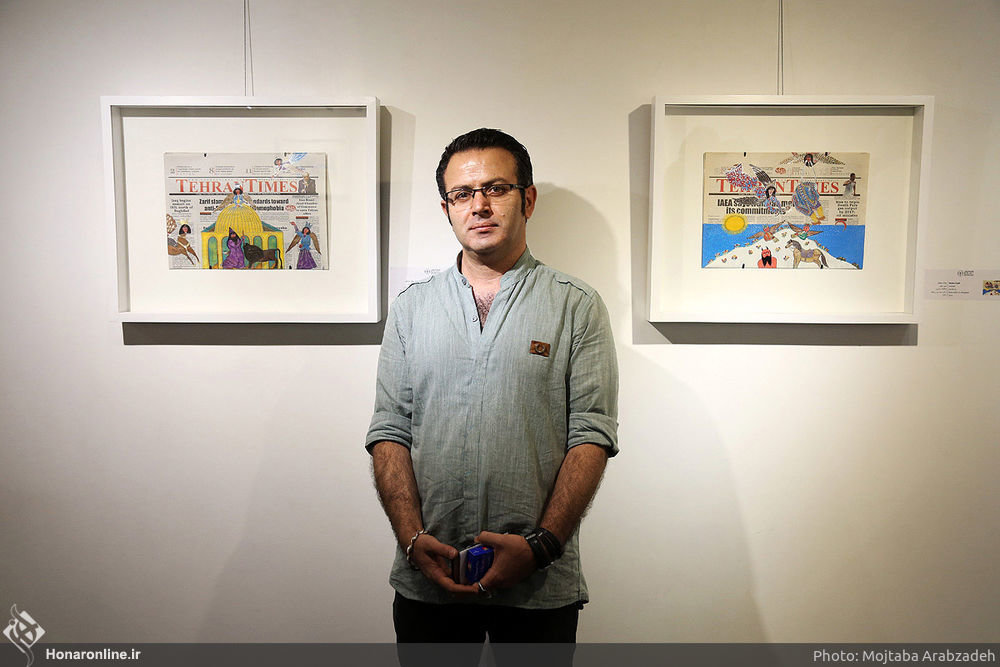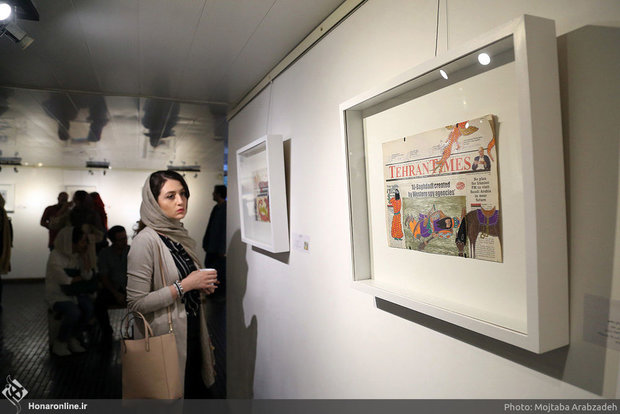And there it is. Graphic designer Yazdan Saadi has framed editions of the Tehran Times front page as a surface for his miniature paintings hanging on the walls of Seyhun Gallery in Tehran.
The paintings take visitors beyond their imagination into the world of ancient Persian tales. It is as if a morshed (mentor) is standing there beside the works and is narrating stories driven from the heart of ancient Iranian history for you.
The characters of Ferdowsi’s epic masterpiece Shahnameh—like Rustam as a symbol of a strong Iranian man, winged angels, dragons and demons—are all seen here and there on the front pages of the editions picked for the collection.

“Iranian miniatures have long been accompanied by Persian texts telling the story of a writer, a poet, or a hero to help viewers to better understand the story,” Saadi told the Tehran Times in an interview on Saturday.
In the contemporary world, where miniatures, tales and stories are sinking into oblivion, the art has his own key.
He said, “I tried to separates texts from images. That is, there is no real story told but the images remain here and there. And sure enough, the text is not in Persian, so it cannot distract the viewer.”
“The viewer only sees miniatures of old Persian tales through images. It is like taking a quick trip and touring inside the ancient Persian tales and returning home through a newspaper from the modern world,” he explained.
This was accomplished by adding miniatures to the world of art of today he said, adding, “I actually made it modern.”
“I set the characters, and the viewer can make a story out of it. When you see the work you think it tells you a story or you can trace a storyline, but actually, there is no story.”
Saadi said that, in fact, the exhibition calls on the visitors to engage in a clever visual game.
“They suddenly travel on a fairy tale and then return to the real world through a painting.
“With a simple image on a newspaper, I take the visitors to a fantasy world and bring them back home in time. This does not happen with usual paintings; it is the newspaper that reminds one of being in the moment.”
He also explained about his reasons for selecting the Tehran Times for use as an artistic material. “I knew this would not be good with Persian fonts since they do not have the potential to be worked and played with.”
The editions of the Tehran Times selected for the collection were published in 2014.
He said, “I wanted the news to be old and be forgotten. I did not intend to give a specific perspective to the visitors because I did not want to draw the visitors’ attention to the texts.
“I liked the graphic design of the daily. I worked on the 2014 editions. The logo was located just in the middle of the page in the best place possible. It was quite simple and the top photo was right in the middle with two columns each besides the photo.
“I wanted to pick something that reflected the moment. I chose the Tehran Times because of its name and its beautiful graphic fonts. It was classic and attractive, so I chose the daily out of several English dailies I came up with.”
He added that he began in 2014 and finished the same year, when he came up with the idea of mixing Persian miniatures with English texts. He called it a simple research effort for himself.
“I intended to depict the stories from many years ago on an upscale daily leading to a fine and interesting contrast,” he remarked.
Saadi also noted that the paintings on the front page of the daily are done in such a way that one can read the back of the page.
“I practiced to accomplish [painting] on a type of material whose back page would not be spoiled. I thought maybe someone who has the painting would like to open the frame and read the news some years later, since all the pages of the daily are preserved in one frame,” he concluded.
The exhibition will run until October 24 at the gallery located at No. 11, 4th St., Vozara Ave.
MNA/TT

























Your Comment